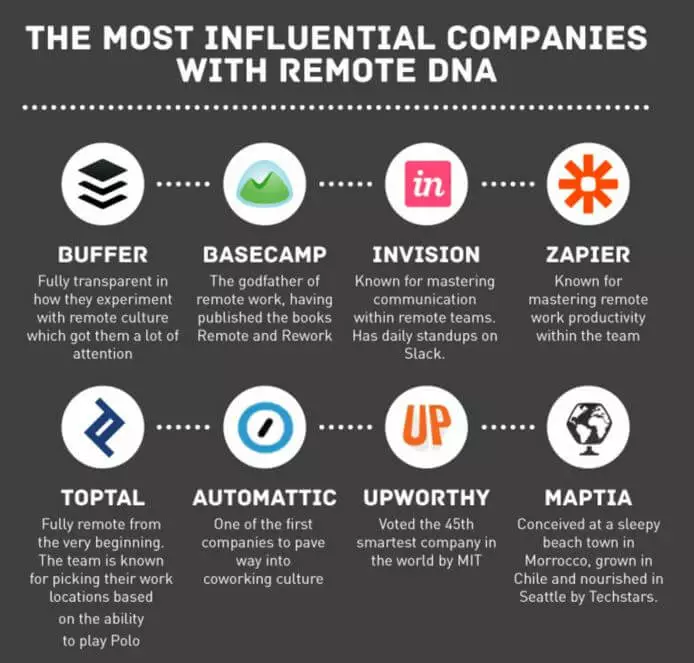5 Remote Work Myths We Should Finally Relinquish

This year, more companies are considering the advantages of remote work than ever before. Even if they don't work from home on a regular basis, it's at least an additional flexibility measure in case of a crisis. But, of course, changing the paradigm is not so easy. In this article, let's go through the main remote work myths and fears that prevent many companies from enjoying the amazing benefits working from home brings to both businesses and remote employees.
We hope our positive experience will help you implement new approaches in your company culture and debunk some common myths of remote work.
What Are the Top 5 Myths of Remote Work?
Myth #1. Remote Workers Dictate Their Own Schedules
While this is true in some regard, all remote workers need to be up and working when their clients and coworkers are doing the same. Sure, they may be able to sleep in longer and cut out the commute, but that doesn't mean they are the only masters of their work-related time. A successful remote worker will have a set schedule of remote work that coordinates perfectly with the rest of the team's schedules.
We, at Mailbird, work remotely from different countries literally all around the globe. Some of us are even working on the beach on our vacations. But we have a fixed time for weekly meetings, and we make sure everyone's schedule lets them communicate with other remote teams.
Myth #2. Work Simply Doesn't Get Done from Home
This is one of the top remote work myths you should ignore, since the inverse is actually true. By removing the distractions of the office environment, such as coworkers stopping in to say "hi" or a few minutes of gossip at the water cooler, remote workers focus on the work, rather than other people in the office. With fewer reasons not to pay attention to the task at hand, they can crank out more work each day. It is proven that productivity rises when people work remotely.
It's a question of management, and it can be solved by learning and training. But isn't that what any manager should do to track remote employees? Learn new approaches, help many remote employees become more effective, and lead remote teams without checking each and every step in person.

Myth #3. Remote Workers Are Lazy
Although this is one of the most common remote work myths, quite the opposite is true. Since many members of remote teams work in their physical houses — although many do not — they often set aside a working area. Remote employees are not sitting in their lounge chairs as they chat on a conference call. Instead, they use an area of their dwelling as an office. This allows for easier separation of work life from home life. This balance is essential to any person working remotely, which is why they create a "work only" space to boost productivity.
It's all about self-management. If you want to practice remote work as part of your company culture, yes, you'll need to teach your remote employees how to manage their time from home and be more responsible for the results (or hire those who are already there). What we found helps is having remote work monitoring tools that employees can manage themselves. Computer timer software can be simple, but it is still helpful in determining where roadblocks are happening.
In any case, it's great to have highly responsible and organized people in your company, isn't it? So, again, it's not an obstacle, but just a skill to be trained for remote work. And even if you work in an office most of the time, the company will benefit from it a lot.
Myth #4. Domestic Workers Are Better Than Those Overseas
Talent is talent. If you've found a perfect candidate, but they live on the other side of the world, don't fret! Just because they aren't located within your country or time zone doesn't mean they can't coordinate with your office employees. In fact, as long as you set a standard time for everyone, you can pull in new remote people from across the globe.
Hirers asking the question, "Why will remote working die?" will find that the answer is quite the opposite. By creating a remote working group, you get access to the whole world's talent market with all its diversity in skills and prices, which may be a great benefit for many companies.
For instance, an over-demand on software developers in the Bay Area made it almost impossible to hire a good in-house engineer for reasonable rates. As a result, a whole new industry appeared, assisting to hire remote development teams from all over the world.
Myth #5. Remote Meetings Are Ineffective
Think about it: conference calls have been a part of business meetings for decades. What is the difference between office workers and those who work from home when they are participating in a conference call? Absolutely nothing. Conference calls, video calls, and chat-based meetings don't change in effectiveness based on an individual's location. In fact, frequently coordinating communication of this type will only increase the effectiveness of remote teams.
Yes, you need to plan your meeting accurately to make sure everyone has their time to talk and all questions are discussed. But isn't that important for any meeting? And again, it'll help your team be more efficient. If possible, organising a team building activity every now and then can go a long way. You can check out this guide for some help with that.

Taking on a remote team can be a daunting task, but it's well worth the effort.
It is important to make sure you are clear about your expectations, including the amount of time spent working remotely each week, specific working hours, and the quality of the remote team's work. Once these are in place and the common myths are invalidated, you can begin working with a very driven, talented portion of the business world!
Are you thinking of starting remote work or hiring remote workers? Our blog post series on The Challenges of Remote Working might be very interesting for you to check out.
FAQs about Remote Work
Does remote working really work?
Yes. The companies that support and encourage remote workers report higher levels of employee engagement and retention. With remote work as their company culture, they have decreased employee turnover and increased productivity. The employees report higher employee satisfaction, as well.
What is the best way to work remotely?
Here are some tips on how you can increase your productivity while working from home. - Assign a designated workspace at your home. - Create a strict routine for work and after-work activities. - Maintain healthy communication with your superiors. - Take breaks between work. - Set boundaries between yourself and your family members to minimize distractions.
What do remote workers need?
Remote workers expect flexibility to decide how, when, and where to work. They also need autonomy from their employers to make decisions regarding their work schedules without being under the constant scrutiny of their bosses.
What are the disadvantages of remote work?
Some of the common disadvantages of remote working are: - Employees feel isolated and struggle to understand the company's bigger picture. - It can cause disruptions in a worker's work/life balance. - Remote workers are unable to create relationships with their colleagues. - Remote working can possess a higher risk of distractions and loss in productivity.